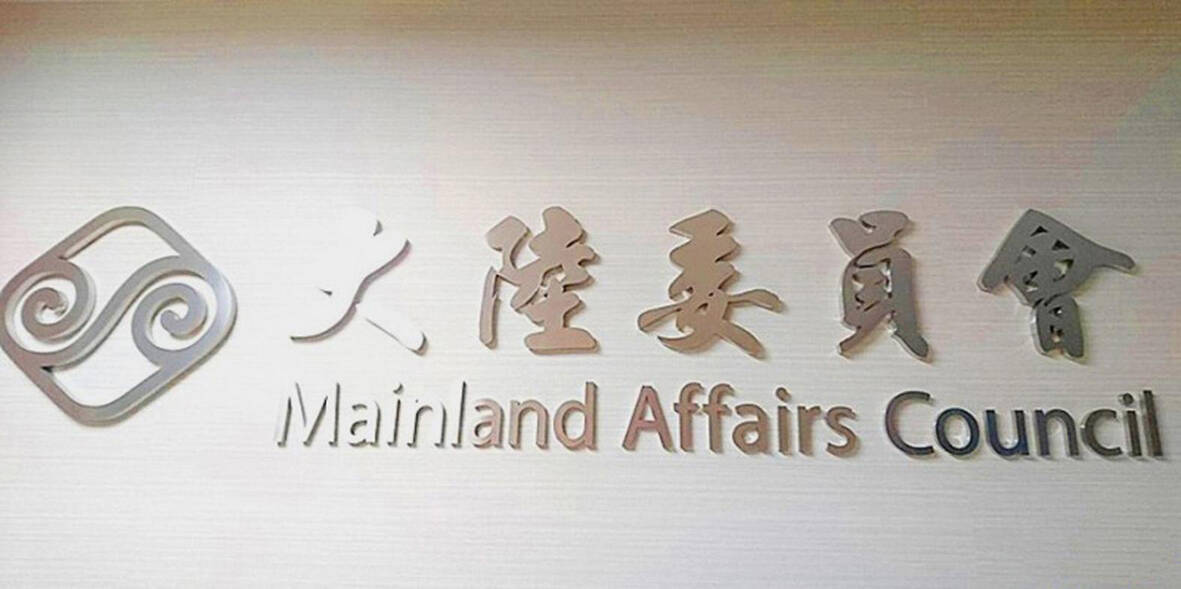A Chinese policy to accept Taiwanese exam results for applications at universities is an attempt to lure young Taiwanese to China for political and social indoctrination, the Mainland Affairs Council (MAC) said on Wednesday.
The statement came after China’s Taiwan Affairs Office spokeswoman Zhu Fenglian (朱鳳蓮) announced that 412 Chinese universities — including the country’s top institutions — would this month start accepting college entrance exam results from the “Taiwan area” without additional fees.
Each student could apply to six schools, and for six majors at each school, Zhu said.

Photo: CNA
Beijing has since 2020 used education policies to attract Taiwanese to China, including the new unified online admissions system, for which it ran trials last year, the council said.
By simplifying administrative procedures, the policy seeks to reduce the number of Taiwanese whose applications are accepted by Chinese universities, but who do not enroll, the council said.
The new policy limits the number of schools to six per student to make the system appear exclusive, it added.
Surveys have shown that support for allowing Taiwanese to study in China has declined in Taiwan, it said, adding that only about 300 Taiwanese have started their studies in China in the past few years.
Beijing has long viewed young people as an important target for its “united front” efforts, the council said.
Especially since the Chinese Nationalist Party’s (CCP) 20th National Congress in October last year, Beijing has stepped up efforts to promote cross-strait integration, it said.
These include preferential measures for Taiwanese to study and start careers in China, the council said, calling them efforts to entice Taiwanese to identify as Chinese.
Beijing seeks to amplify its message by using examples of successful Taiwanese based in China, it added.
“The preferential measures offered to young Taiwanese students by the CCP have a political goal and united front intention,” the council said.
The new system might make it easier to apply, but it still requires prospective students to declare support for the “one country, two systems” formula and “unification” before they can enroll, the council said.
The two sides of the Taiwan Strait have significantly different ways of life, and political and legal systems, the council said.
Beijing has in the past few years clamped down more severely on academic freedom and is stringently enforcing political indoctrination on campuses, it added.
To protect students’ interests, the council said it has set up a section on its Web site with tips for prospective students interested in studying in China, including context to the CCP’s political propaganda and what they can expect after moving to the country.

The High Prosecutors’ Office yesterday withdrew an appeal against the acquittal of a former bank manager 22 years after his death, marking Taiwan’s first instance of prosecutors rendering posthumous justice to a wrongfully convicted defendant. Chu Ching-en (諸慶恩) — formerly a manager at the Taipei branch of BNP Paribas — was in 1999 accused by Weng Mao-chung (翁茂鍾), then-president of Chia Her Industrial Co, of forging a request for a fixed deposit of US$10 million by I-Hwa Industrial Co, a subsidiary of Chia Her, which was used as collateral. Chu was ruled not guilty in the first trial, but was found guilty

DEADLOCK: As the commission is unable to forum a quorum to review license renewal applications, the channel operators are not at fault and can air past their license date The National Communications Commission (NCC) yesterday said that the Public Television Service (PTS) and 36 other television and radio broadcasters could continue airing, despite the commission’s inability to meet a quorum to review their license renewal applications. The licenses of PTS and the other channels are set to expire between this month and June. The National Communications Commission Organization Act (國家通訊傳播委員會組織法) stipulates that the commission must meet the mandated quorum of four to hold a valid meeting. The seven-member commission currently has only three commissioners. “We have informed the channel operators of the progress we have made in reviewing their license renewal applications, and

Taiwan People’s Party (TPP) Chairman Huang Kuo-chang (黃國昌) yesterday appealed to the authorities to release former Taipei mayor Ko Wen-je (柯文哲) from pretrial detention amid conflicting reports about his health. The TPP at a news conference on Thursday said that Ko should be released to a hospital for treatment, adding that he has blood in his urine and had spells of pain and nausea followed by vomiting over the past three months. Hsieh Yen-yau (謝炎堯), a retired professor of internal medicine and Ko’s former teacher, said that Ko’s symptoms aligned with gallstones, kidney inflammation and potentially dangerous heart conditions. Ko, charged with

Taiwan-based publisher Li Yanhe (李延賀) has been sentenced to three years in prison, fined 50,000 yuan (US$6,890) in personal assets and deprived political rights for one year for “inciting secession” in China, China's Taiwan Affairs Office spokesman Chen Binhua (陳斌華) said today. The Shanghai First Intermediate People’s Court announced the verdict on Feb. 17, Chen said. The trial was conducted lawfully, and in an open and fair manner, he said, adding that the verdict has since come into legal effect. The defendant reportedly admitted guilt and would appeal within the statutory appeal period, he said, adding that the defendant and his family have